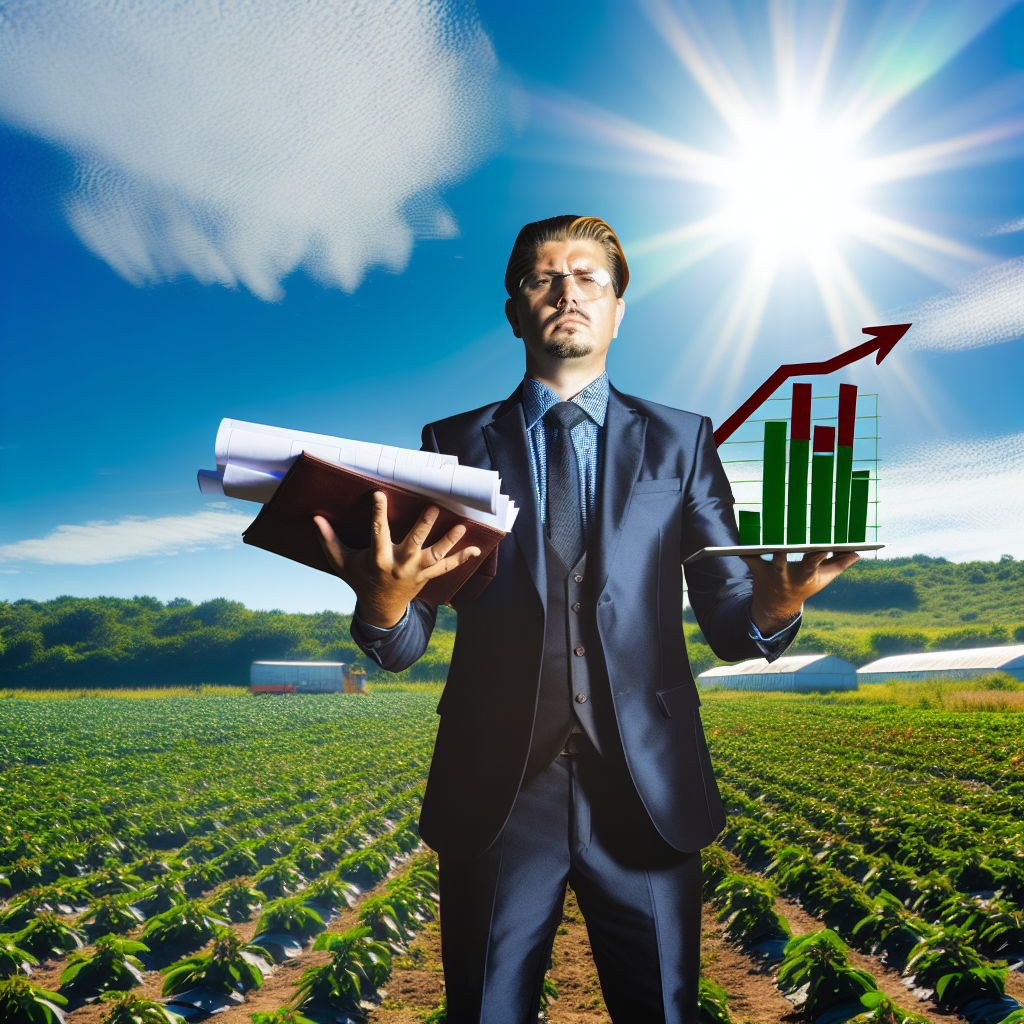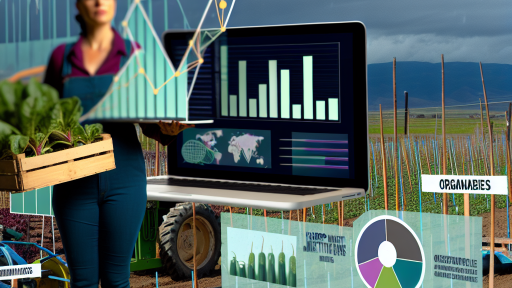Understanding Smart Agribusiness
Key Concepts in Smart Agribusiness
Smart agribusiness refers to the integration of technology in agriculture.
This approach enhances productivity and efficiency across the supply chain.
Farmers leverage data analytics and precision agriculture for decision-making.
Additionally, smart techniques improve resource management and sustainability.
Current Trends Shaping Agribusiness
Emerging technologies are revolutionizing traditional farming methods.
For instance, drone technology offers real-time monitoring of crops.
Moreover, IoT devices gather vital data for enhancing crop yields.
Artificial intelligence is also playing a significant role in predictive analytics.
These advancements help farmers cut costs while maximizing profits.
Benefits of Investing in Smart Agribusiness
Investing in smart agribusiness yields numerous advantages.
Firstly, it increases operational efficiency and reduces waste.
Secondly, it supports better decision-making through accurate data.
Thirdly, these investments foster sustainable agricultural practices.
Overall, smart agribusiness investments create significant long-term value.
Challenges Facing Smart Agribusiness
Despite its benefits, smart agribusiness faces challenges.
Transform Your Agribusiness
Unlock your farm's potential with expert advice tailored to your needs. Get actionable steps that drive real results.
Get StartedData privacy and security concerns are increasingly important.
Moreover, the initial investment costs can deter potential investors.
Lastly, farmer education and training remain critical for success.
Investing in Technology: The Role of Robotics and Automation in Farming
The Rise of Automation in Agriculture
Automation in agriculture significantly increases efficiency.
Farmers now utilize robotics to enhance productivity.
Moreover, automation reduces the reliance on manual labor.
This shift results in cost savings and higher yields.
Types of Agricultural Robotics
Several types of robots serve varying needs in farming.
- Drones are used for aerial crop monitoring.
- Autonomous tractors perform tilling and planting.
- Robotic harvesters efficiently pick fruits and vegetables.
Each robot offers unique advantages to farmers.
Benefits of Implementing Robotics
Robotics leads to faster operational processes.
Farmers can manage larger areas more effectively.
Furthermore, automated systems minimize human error.
This technology boosts overall production quality.
Challenges in Adopting Agricultural Technology
Despite the benefits, some challenges exist.
Initial costs of robotics can deter small farmers.
Additionally, there is a learning curve associated with new technology.
Farmers need proper training to maximize these tools.
Future Trends in Agricultural Robotics
The future of farming includes continuous advancements.
Developers are integrating AI into agricultural machines.
This integration allows for predictive analytics and smart farming.
As technology evolves, farmers will integrate more automation.
Successful Cases of Automation
Several farms successfully implemented robotic systems.
Springhill Farms adopted drones for monitoring crop health.
Sunnyvale Orchards utilized robotic harvesters to improve efficiency.
Showcase Your Farming Business
Publish your professional farming services profile on our blog for a one-time fee of $200 and reach a dedicated audience of farmers and agribusiness owners.
Publish Your ProfileThese success stories demonstrate the potential of automation.
Data-Driven Decisions: Utilizing Big Data and Analytics in Agribusiness
The Importance of Big Data
Big data is transforming the agribusiness landscape.
It allows farmers to make informed decisions.
Consequently, they can maximize yields and profits.
Moreover, big data enhances resource management.
Key Data Sources for Agribusiness
Several sources of data exist in agribusiness.
- Weather data provides insights into climate conditions.
- Soil sensor data offers information on nutrient levels.
- Market trends help predict consumer behavior.
- Satellite imagery delivers valuable information on crop health.
Data Analytics Applications
Data analytics plays a crucial role in agribusiness.
Farmers use predictive analytics to forecast yields.
This forecasting helps in planning resource allocation.
Additionally, analytics can identify pest and disease outbreaks.
Such identification allows for timely intervention.
Choosing the Right Technology
Technology selection is vital for effective data use.
Farm management software is a popular choice.
Furthermore, cloud solutions enable real-time data access.
Look for platforms that integrate various data sources.
Case Studies of Successful Implementation
Many agribusinesses have successfully adopted big data strategies.
For example, GreenField Ag used analytics to improve crop yields.
They applied data-driven insights to adjust irrigation schedules.
As a result, they saw a 30% increase in production.
Challenges in Data Utilization
Despite its benefits, challenges exist in using big data.
Data security remains a significant concern for farmers.
Moreover, there is a need for training on data interpretation.
Additionally, integrating new technologies can be daunting.
The Future of Big Data in Agribusiness
The future holds immense potential for big data in agriculture.
Emerging technologies will further enhance data collection.
As precision agriculture develops, insights will become more granular.
Ultimately, data-driven decisions will lead to sustainable practices.
Find Out More: Top Market Trends Impacting Crop Production
Sustainable Practices: Investing in Eco-Friendly Farming Techniques
Importance of Sustainable Farming
Sustainable farming is crucial for future food security.
It enhances biodiversity and supports healthy ecosystems.
Moreover, it reduces dependency on harmful chemicals.
Techniques for Sustainable Farming
There are several eco-friendly techniques farmers can adopt.
Crop rotation improves soil health and increases yields.
Cover cropping prevents soil erosion and enhances moisture retention.
Additionally, precision farming optimizes resource use and minimizes waste.
Investing in Technology
Investing in smart technology can transform traditional farming practices.
For instance, using drones can enhance crop monitoring.
Data-driven analytics helps in making informed decisions.
Consequently, these technologies lead to increased efficiency and productivity.
Long-Term Benefits
Implementing sustainable practices offers long-term benefits.
Showcase Your Farming Business
Publish your professional farming services profile on our blog for a one-time fee of $200 and reach a dedicated audience of farmers and agribusiness owners.
Publish Your ProfileHealthy soils lead to better crop yields over time.
Moreover, sustainable practices reduce production costs in the long run.
Customers increasingly prefer products certified as eco-friendly.
Collaboration and Learning
Collaboration among farmers can foster knowledge sharing.
Joining local co-ops can provide access to shared resources.
Participating in workshops keeps farmers informed about best practices.
Thus, collective effort strengthens the entire agricultural community.
Uncover the Details: Key Factors Shaping Agricultural Markets Today
Precision Agriculture: Maximizing Yields with Modern Farming Equipment
Introduction to Precision Agriculture
Precision agriculture uses technology to enhance farming efficiency.
Farmers can achieve higher yields while minimizing resource use.
Smart technology allows farmers to make data-driven decisions.
Technology Integration in Farming
Integrating technology improves productivity and profitability.
Farm management software streamlines operations and data collection.
Drones provide essential aerial imaging for crop monitoring.
This information helps farmers detect issues early.
Soil sensors give real-time data about moisture and nutrient levels.
Modern Farming Equipment
Modern equipment significantly boosts agricultural efficiency.
Tractors equipped with GPS technology enhance planting accuracy.
Automated irrigation systems conserve water and reduce labor.
Robotic harvesters efficiently gather crops, minimizing waste.
Data Analytics and Decision Making
Data analytics enables informed decision-making in farming.
Farmers can analyze yield data to optimize crop rotation.
This analysis improves both short-term and long-term yields.
Historical weather data helps predict future planting conditions.
Benefits of Precision Agriculture
- Increased crop yields through optimized resource management.
- Reduced environmental impact by minimizing chemical usage.
- Enhanced profitability by lowering operational costs.
Customer Success Stories
Many farmers have adopted precision agriculture successfully.
Mark Johnson, a corn farmer, increased his yield by 20%.
He utilized soil sensors and GPS technology to monitor crops.
Meanwhile, Lisa Harper improved her soybean production through data analytics.
Her profits increased significantly with better resource management.
Delve into the Subject: Analyzing Market Demand for Modern Farmers

Diversification Strategies: Expanding Crop Variety to Increase Profitability
Why Diversification Matters
Diversification protects against market fluctuations and crop failures.
It allows farmers to tap into different revenue streams.
Consequently, this approach minimizes risk and stabilizes income.
Identifying Suitable Crop Varieties
Researching local market demands is essential for selecting crops.
Consider growing specialty crops for higher profit margins.
Additionally, evaluate climate and soil conditions for new crops.
Popular Specialty Crops
- Organic vegetables, which command premium prices.
- Herbs and spices, popular for culinary uses.
- Exotic fruits, appealing to niche markets.
Implementing Crop Rotation
Crop rotation improves soil health and reduces pests.
This practice also enhances yields over time.
Furthermore, it supports environmental sustainability.
Effective Rotation Strategies
- Rotate between legumes and cereals to fix nitrogen.
- Incorporate cover crops for soil enrichment.
- Plan rotations based on market trends and seasons.
Utilizing Technology for Crop Diversity
Modern technology simplifies the management of various crops.
Showcase Your Farming Business
Publish your professional farming services profile on our blog for a one-time fee of $200 and reach a dedicated audience of farmers and agribusiness owners.
Publish Your ProfileConsider precision agriculture to optimize growing conditions.
Software tools can help track market trends and forecast profits.
Recommended Technologies
- Drones for assessing crop health and growth rates.
- Mobile apps for monitoring weather and soil conditions.
- Data analytics tools to analyze market demands.
Marketing Diverse Products
Effective marketing increases visibility and sales of diverse crops.
Utilize social media to reach potential customers quickly.
Furthermore, consider local farmers’ markets for direct sales.
Building a Brand
- Develop a unique selling proposition (USP) for your crops.
- Engage with local communities to build trust.
- Leverage organic certification to attract health-conscious consumers.
See Related Content: Navigating Commodity Price Fluctuations in Farming
Utilizing E-commerce: Selling Directly to Consumers for Higher Margins
The Power of Direct Sales
Direct sales empower farmers to connect with consumers.
This connection boosts brand loyalty and consumer trust.
Moreover, selling directly can enhance profit margins significantly.
Setting Up Your Online Store
Establishing an online store is crucial for success.
Choose an e-commerce platform that suits your needs.
Popular options include Shopify, WooCommerce, and BigCommerce.
Each platform offers different features for farmers.
Next, invest in a user-friendly website design.
Key Features to Consider
- Responsive design to attract mobile users.
- User-friendly navigation to enhance customer experience.
- High-quality images to showcase products effectively.
Marketing Your Products Online
Effective marketing strategies are essential for visibility.
Utilize social media platforms to promote your offerings.
Platforms like Instagram and Facebook can significantly increase sales.
Email marketing also helps retain customers and share promotions.
Content Creation for Engagement
Engaging content can attract potential buyers.
Create blogs, videos, and recipes using your products.
This strategy positions you as an authority in your niche.
Managing Customer Relationships
Building strong customer relationships remains vital.
Utilize customer feedback to improve products and services.
Additionally, consider implementing a loyalty program.
This approach encourages repeat purchases and brand loyalty.
Leveraging Data for Business Growth
Data analysis can provide valuable insights into sales trends.
Track customer buying behaviors to refine your offerings.
Moreover, use analytics tools to measure marketing effectiveness.
Adjusting Strategies Based on Insights
Regularly review your strategies to ensure effectiveness.
Adapt to market changes to meet consumer demands.
This proactive approach fosters growth in the competitive marketplace.
Climate Resilience: Investing in Adaptation Technologies for Extreme Weather
The Importance of Climate Resilience
Climate change is increasingly impacting agricultural productivity.
Extreme weather events threaten food security worldwide.
Investing in climate resilience is crucial for sustainable agriculture.
Farmers can mitigate risks by adopting new technologies.
Adaptation reduces vulnerability and enhances potential profits.
Types of Adaptation Technologies
Various adaptation technologies can optimize agriculture.
- Precision farming utilizes data to enhance crop yields.
- Soil moisture sensors help farmers monitor irrigation needs.
- Weather forecasting tools provide timely alerts for adverse conditions.
- Drought-resistant crops ensure stable production during dry spells.
Investment Strategies for Farmers
Investing in adaptation technologies requires strategic planning.
To maximize profits, farmers should consider the following:
- Assess local environmental conditions carefully.
- Identify and prioritize high-impact technologies.
- Collaborate with agricultural researchers for innovative solutions.
- Seek government grants and funding opportunities.
Case Studies of Successful Adaptation
Several farmers have successfully implemented adaptation technologies.
Showcase Your Farming Business
Publish your professional farming services profile on our blog for a one-time fee of $200 and reach a dedicated audience of farmers and agribusiness owners.
Publish Your ProfileFor example, Maria Lopez adopted precision farming techniques.
As a result, her crop yields increased by 30% over three years.
Similarly, Green Valley Farms invested in weather forecasting tools.
This investment helped them avoid losses during severe storms.
Future Trends in Agribusiness Investments
The future of agribusiness investments lies in technology integration.
Artificial intelligence can further enhance farming practices.
Blockchain may streamline supply chain processes, ensuring transparency.
Additionally, new funding models will support innovative adaptations.
Staying informed about trends is essential for success.




